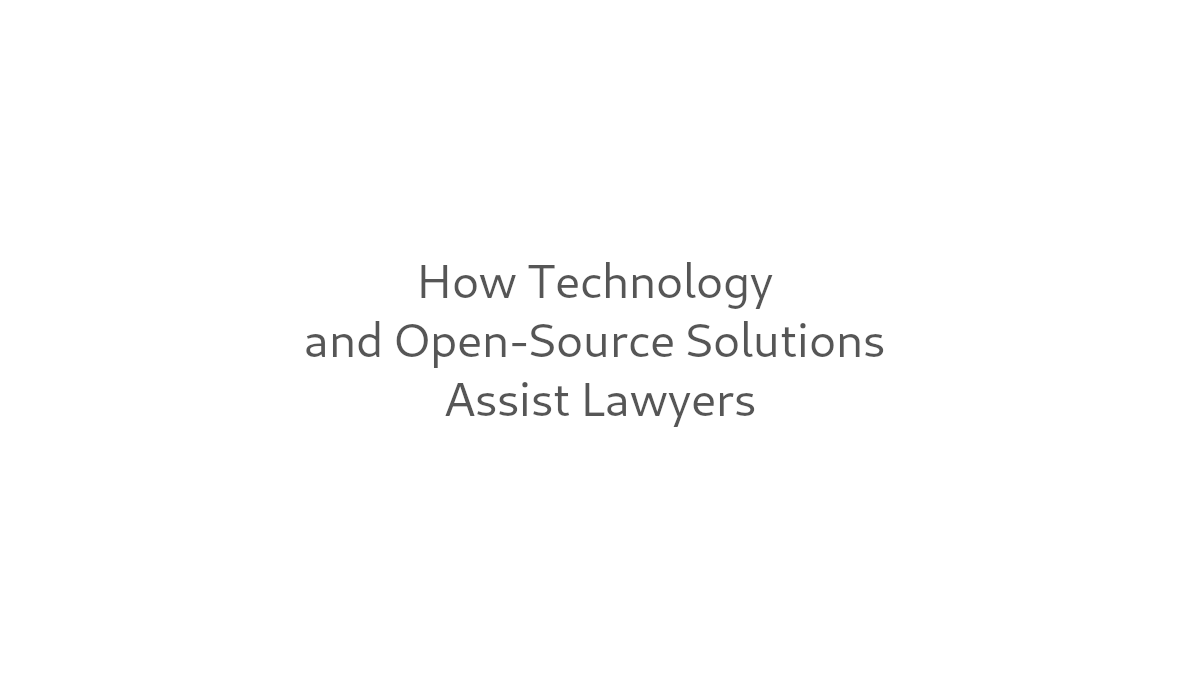How Technology and Open-Source Solutions Assist Lawyers
Introduction to Technology in Legal Practices
Technology has transformed nearly every industry, and the legal profession is no exception. Lawyers today leverage advanced technological tools to streamline their workflows, improve client communication, enhance legal research capabilities, and manage documentation more efficiently. One significant area in which lawyers are increasingly benefiting is through the use of open-source software solutions.

Understanding Open-Source Software
Open-source software refers to programs whose source code is freely accessible, allowing users to modify and improve the software according to their specific needs. For legal professionals, open-source technology offers several advantages, such as cost-effectiveness, flexibility, security, and community-driven innovation.
Efficient Document Management
One of the primary ways lawyers use technology is in document management. Handling large volumes of paperwork is an inherent part of legal work. Traditional methods of storing and retrieving documents are not only time-consuming but also prone to errors. Document management systems, many of which are open-source like LogicalDOC and Alfresco, enable lawyers to organize and retrieve documents efficiently, securely store sensitive client data, and automate routine tasks such as indexing and version control.
Enhanced Legal Research Capabilities
Legal research has also been significantly enhanced through technology. Open-source databases and research platforms such as CourtListener and OpenJurist provide free access to extensive repositories of legal documents, court opinions, and legislative histories. These tools democratize access to legal resources, allowing smaller firms and solo practitioners to perform high-quality legal research without prohibitive costs.
Secure Communication Tools
Communication is another area where technology aids legal practices. Lawyers can now use secure, encrypted communication platforms to ensure client confidentiality while facilitating easy and timely interactions. Platforms like Signal offer end-to-end encryption and are open-source, providing lawyers transparency in how their data is handled.
Effective Case Management Software
Case management software is yet another critical technological advancement helping law firms operate efficiently. Open-source case management tools such as Casebox and ArkCase offer customizable platforms that help lawyers manage calendars, client contacts, case histories, and deadlines, ensuring critical tasks are never overlooked.
Strengthened Cybersecurity Measures
Additionally, technology assists lawyers through improved cybersecurity measures. Protecting sensitive client information is paramount in the legal profession. Open-source cybersecurity tools provide transparency, allowing law firms to verify that software adheres to stringent security standards. Solutions like OpenVPN and KeePass provide secure virtual private networks and encrypted password management, respectively, offering robust protection against data breaches.
Streamlined Billing and Accounting
Lawyers also use technology to improve client billing and accounting processes. Open-source accounting software, such as GnuCash, enables law practices to maintain accurate financial records, automate invoicing, and easily generate financial reports. Such software not only reduces the margin of error but also enhances financial transparency and client trust.
Leveraging Artificial Intelligence
Furthermore, open-source artificial intelligence tools are emerging as revolutionary assets in the legal field. AI-driven solutions like OpenAI’s GPT models can aid in drafting contracts, predicting legal outcomes, and automating routine administrative tasks, thereby freeing lawyers to focus on complex legal strategies and client interactions.
Conclusion
In conclusion, technology, particularly open-source solutions, plays an increasingly pivotal role in modern legal practice. By adopting these technologies, lawyers can significantly enhance their efficiency, accuracy, security, and overall service quality, ultimately leading to better outcomes for their clients and sustained growth for their businesses.